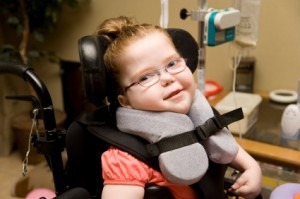When a woman is pregnant, the umbilical cord acts as a lifeline between her and the fetus. The umbilical cord is a flexible tube-shaped structure that removes waste from the baby’s circulation and […]
The chronic condition known as cerebral palsy is usually divided into different types. Each type of cerebral palsy causes a different set of symptoms because of the different parts of the brain that have been damaged, often due to birth injury or improper prenatal care. Among those affected with the condition cerebral palsy, there are about 10 percent, according to Bright Tots, who have the mixed type.
 When someone has mixed type CP they tend to have the uncontrolled movements of the athetoid type and the muscle tightness of the spastic type. The affected person will sometimes experience muscles that are loose (as with ataxic cerebral palsy) and others that are tight. In this form of the condition there is damage to the brain in both the pyramidal and extrapyramidal areas. Most commonly the spastic symptoms are noticed first and are followed by involuntary movements sometime between 9 months and 3 years of age. Although a combination of the spastic and athetoid types is the most widely seen mix, any combination is possible. Severe mental retardation is also a strong possibility among those with mixed CP.
When someone has mixed type CP they tend to have the uncontrolled movements of the athetoid type and the muscle tightness of the spastic type. The affected person will sometimes experience muscles that are loose (as with ataxic cerebral palsy) and others that are tight. In this form of the condition there is damage to the brain in both the pyramidal and extrapyramidal areas. Most commonly the spastic symptoms are noticed first and are followed by involuntary movements sometime between 9 months and 3 years of age. Although a combination of the spastic and athetoid types is the most widely seen mix, any combination is possible. Severe mental retardation is also a strong possibility among those with mixed CP.
Spastic quadriplegia, spastic hemiplegia and spastic diplegia are grouped together because they all result in muscle stiffness and tightening. The difference between them is determined by how many of the portions of the body are affected. Athetoid, choreoathetiod and dystonic are known as the dyskinetic forms and are characterized by spontaneous and sluggish movement. Problems with depth perception, balance and weak muscles are attributed to ataxic CP, so it is grouped on its own.
As one might assume, because of the combination of symptoms in a person with mixed type cerebral palsy, treating the condition can be more challenging than treating someone with just one type of the condition. Patients with mixed CP often have acute communication troubles, so assessing mental capability can be complicated. Even processing what others are saying can be a challenge for some people with this combined type. Vision and hearing problems may also be involved, adding to the communication complications. Some vision issues frequently seen are lazy eyes or cross eyes and sometimes cortical blindness, which is when the eye functions properly but the person cannot see because the portion of the brain responsible for processing the information is damaged. Problems with swallowing are also quite common in people with the mixed form, often resulting in nutritional deficiencies.
The majority of babies will be delivered without serious complication, but there are some times when mistakes do occur. If you have a child affected by cerebral palsy and you feel that it was caused by a medical error, you should speak with an experienced attorney with a background in Dallas birth injury and medical malpractice cases. We regularly deal with these kinds of cases and can offer you a free assessment. Just take a moment to fill out our form and we will be in touch to discuss your options.
Note: The information that was utilized in this post was gathered from the use of secondary sources. This information used has not been confirmed or independently verified. If you locate any information that is not correct, please contact our firm as soon as possible so that we can make the appropriate corrections. If you find any information that is false, we will remove or correct the post immediately after it is brought to our attention.
Disclaimer: As a valued member of the Dallas community, Rasansky Law Firm’s goal is to improve the safety of all residents in the great state of Texas. These posts should not be viewed as a solicitation for business and the information included herein should not be taken as medical or legal advice. The photos used in this post are not representative of the actual crash scene.
Over 30+ Years Of Personal Injury Experience
Top-Rated and Award-Winning Personal Injury Lawyers
Attorneys Available to Discuss Your Case Now
No Fee Unless You Win
Free Confidential Consultation.
Fill out the form below to receive a free and confidential initial consultation with an experienced personal injury lawyer.